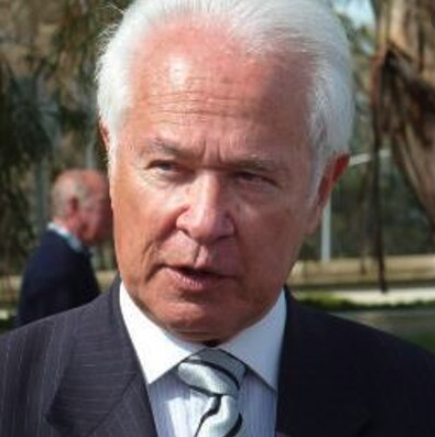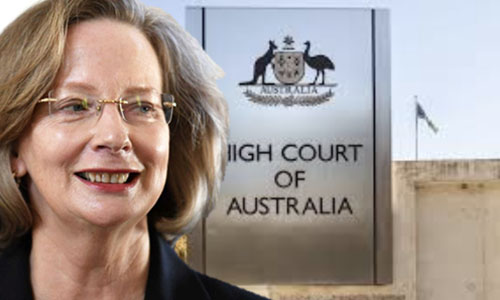
by DAVID FLINT – ONE of the reasons so many Australians voted No in the landslide rejection of the Voice was because the High Court is considered unreliable.
As stated by the No campaign: “The High Court would ultimately determine the Voice’s powers. Legal experts don’t agree, and can’t know for sure, how the High Court will interpret such a constitutional change.”
- More than 80 illegal foreign criminals released into community.
- It’s extremely unusual for the High Court to overrule a precedent.
- The reasons are, in my view, unpersuasive.
There is, at best, a wariness about the High Court.
But such confidence that remains in the court as a national institution will plummet as people become aware of the recent successful actions brought by a convicted terrorist and a convicted child-sex abuser, the subject of final decisions by six or fewer unelected black-robed lawyers.
APPEAL
As to the cases the Court chooses to consider on appeal from lower courts, the High Court usually performs properly, as it did in the appeal brought by Cardinal Pell.
There it applied unanimously the elementary principle, curiously overlooked by the Victorian courts, that a crime must be proven beyond reasonable doubt.
The fact is Australia never had to have a High Court which goes beyond hearing appeals and is empowered to invalidate legislation.
At Federation, neither the UK nor Switzerland did.
And given the disastrous history of the US Supreme Court, especially in relation to the Civil War and later segregation, it is surprising our founders were not wary about creating a similar court here.
In fact, the Australian Constitution leaves it to parliament to confer the power of interpretation on the High Court.
But if it had not, the Court would probably have done what the US Supreme Court did in the celebrated case of Marbury v Maddison (1803) – confer the power on itself.
In any event, we have a High Court that can invalidate legislation. Its decision is final.
That is, final until a future High Court changes its mind. That has just happened, and spectacularly so.
This related to its 2004 decision that the fact that a non-citizen faces indefinite detention does not mean that the provision authorising this is unconstitutional.
Now it is unusual, but not unknown, for the High Court to overrule a precedent.
The High Court has now heard the appeal by a Rohingya man from Myanmar, known as “NZYQ”. He was in detention, after serving time for raping a 10-year-old boy. Normally he would be deported.
DETENTION
The government accepts that he is a refugee and therefore unable to be sent back to Myanmar. Unsurprisingly, no other country will take him. He therefore faced indefinite detention.
The Chief Justice recently and somewhat inscrutably announced that “by at least a majority”, the judges had agreed that the provision was unconstitutional.
The court, he said, would publish reasons “in due course”. There was, of course, an order for costs.
We know neither which judges supported this, nor their reasons. And why was the Court in such a hurry to have NZYQ released?
This reminded me of the 2010 Get-Up case.
There the High Court bent over backwards to hurriedly hear two plaintiffs, both in breach of the electoral law.
In a rushed decision announced on August 6, the Court held the 2006 amendments to the Commonwealth Electoral Act closing the one-week window between the calling of the election and the closing of the rolls was unconstitutional.
Close to 100,000 additional voters, impossible for the AEC to verify, were then put on the rolls.
The August 21 election resulted in a hung parliament. Hardly anyone noticed when the court published its reasons just before Christmas and revealed it was a close 4:3 decision.
The reasons are, in my view, unpersuasive.
Returning to the current cases, the release of NZYQ and it is thought, over 90 others, followed another successful appeal, this time by a notorious terrorist, Algerian Abdul Nacer Benbrika.
He was found guilty in 2008 of leading a terror cell that plotted attacks on Melbourne landmarks in 2005, including the AFL Grand Final.
By a 6:1 decision, the Court ruled that the legislation under which Minister Peter Dutton stripped him of his citizenship was unconstitutional.
SEPARATION
Because of the separation of powers, this, they said, could only be done by a court. This should not have come as a surprise to the legislators as the judges were clearly heading this way.
One solution might be to have a federal terrorist offence which carries a mandatory punishment including the removal of Australian citizenship from dual citizens.
Montesquieu saw the separation of powers, which he found in England, as a way of controlling the abuse of power. In practice, the separation has never been precise.
There are several exceptions, above all the intermingling of the executive and legislative powers in the Westminster system.
While a general ministerial power to strip citizens of their citizenship would not be acceptable, attaching it to a serious criminal conviction with appropriate safeguards should, on reflection, be in order.
What is undoubtedly unacceptable to rank-and-file Australians is to see plaintiffs like these profiting from long and expensive trials, talk of civil claims for damages, the release of others including a murderer, and that the decision of a few judges is final.
GUARDED
The judges might as well say the constitution means whatever they say it means.
The founders who were well informed could have guarded against this.
Patrick Glynn, who proposed the most approved part of the constitutional system, the reference in the preamble to the blessing of Almighty God, proposed the court consist of a chief justice and all State chief justices.
That would have removed its centralist trend that has moved so much power to Canberra and avoided the failure of politicians on both sides to appoint judges who will strongly defend the federation and interpret the constitution as it was originally intended.
What is needed now is to ensure that, as in Switzerland, the Australian people are equipped to review and overrule the court, not on specific decisions, but on constitutional interpretation.
On that, until next time.PC













The recent Dutch election may set a precedent that leads to a sharp break in the current elite consensus regarding immigration, asylum etc in Australia. Years of mass third-world immigration in Europe are leading to a revolt by the remaining indigenous populations. The situation where we now have flying columns of activists, or terrorist sympathisers as they really are, driving around our cities represents an extremely serious development. We are rapidly approaching the same situation as exists in France, where the police have now declared 1500 ‘zones sensible’, or sensitive localities, where they only go fully armed and in section strength. In Sydney at least, most of the NSW ‘zones sensible’ return ALP representatives. Do not expect the ALP governments at State or Federal level to do anything to antigonise their terrorist sympathising power bases.
Just a follow-up thought….if there are readers here who agree with the Citizens Referendum notion, maybe Politicom could be the nucleus for change. Make Citizens Referendums a legislative issue for any politician or aspiring candidate. Talk is over…time for action. Anyone interested?
Should we ask, who in their right mind appoints these activists to such untouchable positions.
Again, in the penultimate paragraph, we have the solution to a number of problems. Citizens Initiated Referendums a la Switzerland can cut through party-political or judicial snubbing of community opinion. It concentrates on a particular issue, rather than a party mantra or propaganda. The Government does not fall, there is no crisis. People in the wider community thus have a voice during the term of a government to force legislation or repeals of noxious laws expeditiously, rather than waiting for years for the political wrangling to change the Law.
As most people know the Howard Government inherited from Keating Labor an out of control arrivals of illegal immigrants using people smuggler boats that sailed from Indonesia, the Howard Government effectively stopped the boats (flood to a trickle of arrivals of Suspected Illegal Entry Vessels) after creating Pacific Solution deterrents that included offshore processing denying the asylum seekers entry into Australia and access to the court system. Processed offshore in Nauru for example the UNHCR asylum assessment was carried out and if the applicant was rejected they had one appeal against the decision. Many rejected applicants agreed to leave and return home, some were given financial incentive to leave.
All of them boarded a smuggler boat without identification, no passport and of course no visa. Apparently they were advised not to retain a passport to make asylum application background checking difficult. The smuggler clients were given a fake passport for the flights to Indonesia. For example “refugees” from Afghanistan travelled into Pakistan and bypassed UNHCR Refugee Camps to pay people smugglers to get them to Australia. Them being, obviously, persons of means as compared to most of the genuine refugees who had little or no funds to pay people smugglers.
Australia has been one of the leading countries for acceptance of genuine refugees sent via refugee camps by the UNHCR, per capita third behind the United States of America and Canada, Norway was third. People smuggler clients who were admitted into Australia took places poorer genuine refugees were waiting for in refugee camps.
The detainees in offshore detention centres were/are not prisoners and are not treated as criminals, they are asylum seekers who arrived here illegally by boat and applied for asylum. Once asylum was denied they were still illegal immigrants and should have been denied entry into Australia.
Rudd Labor instead welcomed smuggler boats and clients by sending RAN ships to sea to ferry the clients to Christmas Island, over 50,000 of them entered Australia, sadly a couple of thousand were lost at sea and presumed to be deceased.
The illegal immigrant asylum seekers Labor admitted were given a temporary protection visa, accommodation and welfare funding for living expenses and even for furniture for public housing they occupied. They also have access to legal aid and the court system and there lies the problems arising from tribunal and court decisions based on refugee advocate lawyer’s submissions.
And look at Labor right now, cap in hand seeking advice from Opposition Leader Peter Dutton and other Coalition MPs as to how to amend the controversial legislation following the High Court decision.
Failed to be accepted asylum seekers have been illegal immigrants denied entry to Australia but supported by taxpayers at offshore detention centres where they are free to move around, to come and go from the centre as they please. They are also entitled to leave at any time they choose, but not to travel to Australia.
The left side of politics have been trying all kinds of tricks to get around offshore detention including the brief period of medical evacuation to Australia legislation that was later repealed, but not before a number of the detainees had entered Australia and gained the access they wanted to apply again for asylum.
Multiculturalism is a failure, too many tribal ethnic groups failing to assimilate, Australians who consider themselves to be visitors in a safe haven from their country of origin, but many travel back and forth for family and business reasons and purposes.
Border control and carefully selecting who can become an Australian citizen must be sorted out and potential social problems avoided. Who would have thought before the 1990s that ASIO and Police Forces would need to have special units to monitor certain ethnic and religious groups, to gather intelligence constantly and protect other Australians against potential terrorism and other criminal activities?